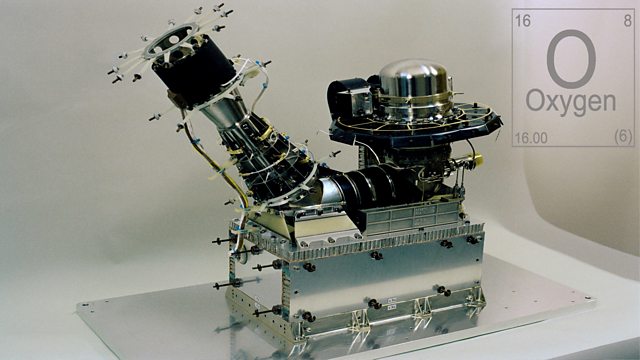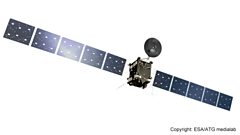Oxygen: Its History and its Future
The history and future of oxygen on earth and in space.
The history of oxygen on Earth, in the human body and new discoveries in space. With the leading authority on geochemistry, Don Canfield, geologist and professor of Ecology at the University of Southern Denmark; Peter Calverley, professor of Respiratory Medicine at the University of Liverpool in the UK and the chief scientist on the European Rosetta Space orbiter project; Kathrin Altwegg from the University of Bern Physics Institute in Switzerland. Bridget Kendall and her guests explore how oxygen appeared and evolved on Earth, what we know about its interaction with the human body and what its discovery on a comet might mean for theories about the origins of life.
(Photo: The DFMS (the Double Focusing Mass Spectrometer on the Rosetta space orbiter, which is the instrument measuring the oxygen in space. Credit: University of Bern)
Last on
Clip
-
![]()
Crashing the Rosetta Space Probe
Duration: 01:01
Donald Canfield
Donald Canfield is the professor of ecology and director of
the Nordic Center for Earth Evolution in
the Institute of Biology, University of Southern Denmark. Much of his research
has focused on the study of oceans and lakes, examining the progressive
oxygenation of the atmosphere through time and how this ultimately allowed for
the development of large animals.
His theory about the relationship between sulphur, iron and
oxygen during the development of the earth’s atmosphere lead to the coining of
the phrase “Canfield Ocean”.
His book, Oxygen: A
Four Billion Year History, explores the vast history of oxygen on Earth and
emphasises its relationship with the evolution of life and the evolving
chemistry of the planet.
Don discusses the early evolution of oxygen on Earth and the
rise of oxygen breathing animals.
Peter Calverley
Peter Calverley is Professor of Respiratory Medicine at the
University of Liverpool and President of the British Thoracic Society. In this
role he focused on building links with both patients and government, and worked
to highlight the shortfall of Respiratory academics in the UK.
His primary research interest is the management of COPD
(chronic obstructive pulmonary disease: an umbrella term for lung diseases
including chronic bronchitis, emphysema and chronic obstructive airways
disease, usually resulting from tobacco smoking). He has updated existing
therapies, including oxygen therapy, and developed new ones.
Peter talks about the history of oxygen in medicine and our
understanding of its application today.
Kathrin Altwegg
Kathrin Altwegg is Professor of Space Research &
Planetary Sciences at the University of Bern, and principal investigator on the
Rosetta mission’s ROSINA instrument.
ROSINA stands for Rosetta Orbiter Spectrometer for Ion and
Neutral Analysis. The instrument combines two mass spectrometers with a
pressure sensor. The mass spectrometers are able to determine the composition
of a comet's atmosphere and ionosphere, measure the temperature and bulk
velocity of the gas and ions, and investigate reactions in which they take
part. The pressure sensor can be used to determine gas density and rate of
radial gas flow. Kathrin describes ROSINA as feeling like a “third child”.
Kathrin’s work with ROSINA has overturned several prevailing
theories about the evolution of the climate and geology of Earth. When the
instrument landed on a comet last year it detected a high prevalence of heavy
water, suggesting that, contrary to previous thinking, the majority of Earth’s
water cannot have arrived here in the form of ice on comets. In addition, the
detection of molecular oxygen on and around the comet contradicted a number of
modelled predictions which held that any free molecular oxygen would react with
hydrogen and form water.
Kathrin explains how they discovered the oxygen molecules in
the tale of comet 67P and what it might mean.
Broadcasts
- Mon 22 Feb 2016 02:06GMT���˿��� World Service except Americas and the Caribbean, Australasia & News Internet
- Mon 22 Feb 2016 05:06GMT���˿��� World Service Americas and the Caribbean
- Tue 23 Feb 2016 09:06GMT���˿��� World Service except News Internet
- Tue 23 Feb 2016 13:06GMT���˿��� World Service Australasia
- Tue 23 Feb 2016 23:06GMT���˿��� World Service except News Internet
- Wed 24 Feb 2016 02:06GMT���˿��� World Service Australasia
Podcast
-
![]()
The Forum
The programme that explains the present by exploring the past



